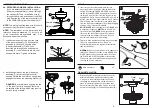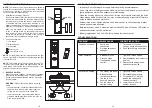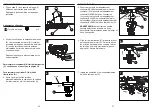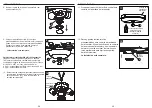
HARDWARE CONTENTS
5
4
PREPARATION
Before beginning assembly of product, make sure all parts are present. Compare parts
with package contents list and hardware contents list. If any part is missing or damaged,
do not attempt to assemble the product.
Estimated Assembly Time:
45 minutes.
Tools Required for Assembly (not included): Phillips screwdriver, step ladder, electrical
tape, pliers, wire cutters, wire strippers.
SAFETY INFORMATION
READ AND SAVE THESE INSTRUCTIONS
Please read and understand this entire manual before attempting to assemble, operate or install the product.
• When using an existing outlet box, be sure the box is securely attached to the building structure and can
support the full weight of the fan, so to avoid potential serious injury or death.
• All wiring must be in accordance with the National Electrical Code “ANSI/NFPA 70” and local electrical
codes. Electrical installation should be performed by a qualified licensed electrician.
• DO NOT
use bulbs with wattage greater than the maximum value stated on the fixture and in this manual.
Using a higher wattage bulb than specified will increase fixture temperature and cause risk of fire.
• Disconnect the electrical supply circuit to the fan before installing kit.
• Electrical diagrams are for reference only.
• The net weight of this fan including the light kit is: 17.42 lbs.
WARNING
• ELECTRIC SHOCK HAZARD
- To reduce the risk of electric shock, do not use this fan with any solid-
state speed control device.
• ELECTRIC SHOCK HAZARD
- To reduce the risk of electric shock, make sure the electricity has been
turned off at the circuit breaker or fuse box before beginning installation.
• PERSONAL INJURY HAZARD
- To reduce the risk of injury to persons, install fan so the blades are 7
ft. (2.1m) above the floor.
• ELECTRIC SHOCK HAZARD
- Do not install this fan with variable speed wall control or wall-mounted
dimmer switch. It will permanently damage the fan’s remote control receiver and cause the fan’s
functions to fail.
CAUTION
• PERSONAL INJURY HAZARD
- To reduce the risk of personal injury, do not bend the blade brackets
when installing the brackets, balancing the blades, or cleaning the fan. DO NOT insert foreign objects
in between the rotating fan blades.
• FIRE, ELECTRIC SHOCK OR PERSONAL INJURY HAZARD
- To reduce the risk of fire, electric
shock, or personal injury, mount to an outlet box marked “ACCEPTABLE FOR FAN SUPPORT OF
35.1 lbs OR LESS” and use the mounting screws provided with the outlet box. Most outlet boxes
commonly used for the support of lighting fixtures are not acceptable for fan support and may need to
be replaced. Consult a qualified licensed electrician if in doubt.
ON
ON / OFF switch
NO Variable speed wall control
NO Dimmer switch
AA
BB
Wire Connector
Qty. 3+1 extra
Blade Screw
Qty. 15+1 extra
This equipment has been tested and found to comply with the limits for a Class B digital device, pursuant to Part 15 of the FCC
Rules. These limits are designed to provide reasonable protection against harmful interference in a residential installation.
This equipment generates, uses and can radiate radio frequency energy and, if not installed and used in accordance with the
instructions, may cause harmful interference to radio communications. However, there is no guarantee that interference will not
occur in a particular installation. If this equipment does cause harmful interference to radio or television reception, which can be
determined by turning the equipment off and on, the user is encouraged to try to correct the interference by one or more of the
following measures:
Reorient or relocate the receiving antenna.
Increase the separation between the equipment and receiver.
Connect the equipment into an outlet on a circuit different from that to which the receiver is connected.
Consult the dealer or an experienced radio/TV technician for help.
CAUTION: Any changes or modifications not expressly approved by the grantee of this device could void the user’s authority to
operate the equipment.
This device complies with Part 15 of the FCC Rules. Operation is subject to the following two conditions:
(1) This device may not cause harmful interference, and (2) this device must accept any interference received, including
interference that may cause undesired operation.




































